Can Ashwagandha Help Ease Stress and Anxiety in Body Dysmorphic Disorder?
Introduction
Body Dysmorphic Disorder (BDD) is a deeply distressing mental health condition where individuals become preoccupied with perceived flaws in their appearance—flaws that often appear invisible to others. The emotional toll of BDD is immense. Sufferers frequently experience intense anxiety, obsessive thoughts, and overwhelming stress that disrupts daily life. While therapy and medication remain the foundation of treatment, natural supplements like ashwagandha are gaining attention for their potential to help regulate stress hormones and calm an overactive nervous system.
This article explores how ashwagandha works on a biochemical and psychological level, how it may benefit people with BDD, and how it can be combined with therapy, mindfulness, and other natural approaches for a holistic healing effect.
Looking for supplements for This? Click here.
Understanding BDD: The Brain in Overdrive 🧩
Body Dysmorphic Disorder isn’t just about self-esteem—it’s a neurobiological imbalance involving distorted perception, anxiety, and hypervigilance. The brain’s threat system stays in constant activation, scanning the mirror or others’ reactions for signs of rejection or imperfection.
Studies show abnormalities in the visual processing regions (where self-image is interpreted) and the amygdala, which handles fear and emotional reactivity. This creates a loop where minor details trigger exaggerated emotional responses, leading to compulsive checking or avoidance behaviors.
Stress and anxiety become not just symptoms but drivers of the disorder. The more anxious the brain, the stronger the obsession. The stronger the obsession, the more anxious the body becomes. Breaking this cycle requires restoring nervous system balance—precisely where adaptogenic herbs like ashwagandha may help.
What Is Ashwagandha? 🌱
Ashwagandha (Withania somnifera), often called Indian ginseng or winter cherry, is a powerful adaptogenic herb used for over 3,000 years in Ayurvedic medicine. The term “adaptogen” refers to natural substances that help the body adapt to stress and restore equilibrium.
Ashwagandha is known for its ability to:
Reduce cortisol, the body’s main stress hormone
Promote calm alertness rather than sedation
Support thyroid and adrenal balance
Improve resilience to physical and emotional stress
Modern studies back these claims, showing that ashwagandha can significantly reduce anxiety and improve sleep, focus, and overall well-being—all areas that tend to be dysregulated in people with BDD.
The Stress-Anxiety Cycle in BDD ⚡
People with BDD live in a constant state of threat—a fight-or-flight response triggered by internal fears rather than external danger. This stress loop floods the body with cortisol and adrenaline, creating symptoms like muscle tension, heart palpitations, digestive distress, and racing thoughts.
Over time, chronic stress rewires the brain, making it more reactive and less capable of regulating emotions. The prefrontal cortex (responsible for rational thinking) weakens, while the amygdala (responsible for fear) grows stronger.
Ashwagandha has been shown to lower cortisol levels and modulate the hypothalamic-pituitary-adrenal (HPA) axis—the body’s central stress-response system. By doing so, it helps dampen the alarm signals that drive obsessive thinking and anxiety in BDD.
Ashwagandha and Cortisol Regulation 🌿➡️😌
One of the most documented benefits of ashwagandha is its ability to reduce cortisol, the hormone released during stress. In a 2019 study published in the Indian Journal of Psychological Medicine, participants who took 300 mg of ashwagandha twice daily experienced a significant drop in cortisol levels and a corresponding improvement in perceived stress and anxiety.
For individuals with BDD, where stress hormones stay chronically elevated, this could mean fewer panic episodes, more stable moods, and reduced physiological tension. Lower cortisol also improves sleep and concentration, which are often disrupted by obsessive thoughts.
By easing the body’s physical stress response, ashwagandha creates the internal safety needed for emotional healing to begin.
Looking for supplements for This? Click here.
Neurotransmitter Support: Balancing the Brain’s Chemistry ⚖️

Ashwagandha doesn’t just affect hormones—it also influences the neurotransmitters that shape mood and thought patterns. Research suggests that ashwagandha:
Increases GABA (gamma-aminobutyric acid), the brain’s main inhibitory neurotransmitter, which promotes relaxation and calm
Modulates serotonin and dopamine levels, supporting emotional stability and pleasure
Protects neurons from oxidative stress, which can worsen anxiety and depression
In people with BDD, where GABA activity may be low and excitatory chemicals high, this rebalancing effect can reduce the intensity of obsessive thoughts and hyperarousal. The result isn’t numbness—it’s mental clarity and emotional steadiness.
How Ashwagandha Supports Emotional Regulation 💛
Emotional regulation—the ability to calm oneself after distress—is one of the biggest challenges in BDD. Small triggers like a comment about appearance or an unflattering photo can spiral into hours of rumination or avoidance.
Ashwagandha helps by improving resilience to emotional stressors. Regular use strengthens the parasympathetic nervous system (the body’s “rest and digest” mode), allowing faster recovery from emotional spikes.
Clinical data also show improved scores on anxiety and depression scales after 6–8 weeks of supplementation. This steady-state calmness makes it easier for individuals to engage in therapy, handle exposure tasks, and maintain daily routines without being hijacked by anxiety.
Ashwagandha and Sleep: Restoring the Body’s Reset Mechanism 🌙
Sleep disturbance is one of the hidden burdens of BDD. Obsessive thoughts often intensify at night, making it hard to fall or stay asleep. This leads to exhaustion, irritability, and worsened self-perception the next day.
Ashwagandha supports natural sleep cycles by regulating cortisol and enhancing GABAergic activity. In one randomized controlled trial, adults who took 300 mg of ashwagandha twice daily for ten weeks experienced significantly improved sleep quality and reduced insomnia.
By helping the body rest, ashwagandha strengthens the foundation of mental health—since restorative sleep is essential for emotional regulation, neuroplasticity, and self-control.
Adaptogens and the HPA Axis: Rewiring the Stress Response 🔄
Ashwagandha belongs to a class of herbs known as adaptogens, which act like thermostats for the body’s stress response. When cortisol is too high, they lower it; when it’s too low, they help bring it up.
This adaptogenic property means ashwagandha doesn’t just suppress symptoms—it teaches the body to adapt more efficiently to stress over time. For people with BDD, whose nervous systems often swing between hyperarousal and shutdown, this rebalancing effect helps restore physiological and emotional stability.
When combined with mindful practices such as meditation, breathwork, or yoga, the effects of ashwagandha on the HPA axis are amplified, helping the brain and body learn what “calm” truly feels like again.
Ashwagandha’s Cognitive and Focus Benefits 🧠✨
BDD can drain cognitive energy. Mental fatigue from constant self-monitoring makes it hard to focus at work, school, or in relationships. Ashwagandha may enhance cognitive clarity and focus by reducing oxidative stress in the brain and improving acetylcholine function (a neurotransmitter linked to memory and attention).
In a 2020 clinical trial, participants taking ashwagandha showed improved executive function, attention, and information processing speed. This cognitive lift may indirectly help individuals with BDD stay grounded in the present instead of spiraling into obsessive thought patterns.
Dosage and Forms 💊
Ashwagandha supplements are typically available in capsule or powder form. The most researched dosage for stress and anxiety is 300–600 mg per day of a standardized extract containing 5% withanolides (the active compounds).
Suggested daily regimen:
300 mg in the morning with breakfast
300 mg in the evening after dinner
For those sensitive to herbs, starting with 200 mg once daily and gradually increasing is wise. Ashwagandha can also be taken as a powder mixed into warm milk or tea, a traditional Ayurvedic practice that enhances absorption and relaxation.
Look for brands using KSM-66® or Sensoril® extracts, which have been clinically studied for safety and efficacy.
Combining Ashwagandha with Other Supportive Nutrients 🌿➕
Ashwagandha’s calming effects can be enhanced when paired with other evidence-based nutrients that support emotional balance. Some of the best combinations for people with BDD include:
Magnesium glycinate: Deeply relaxes muscles and quiets an overstimulated nervous system.
L-theanine: Promotes alpha brain waves for calm focus and reduced intrusive thoughts.
Omega-3 fatty acids: Improve neurotransmitter fluidity and emotional stability.
B-complex vitamins: Support energy metabolism and healthy brain function.
Probiotics: Strengthen the gut-brain connection, which influences serotonin production.
These synergistic nutrients work together to promote a balanced mood, reduce physiological stress, and improve sleep—addressing the emotional and biological dimensions of BDD simultaneously.
Looking for supplements for This? Click here.
Ashwagandha and Therapy: Creating a Calmer Mind for Healing 🛋️
While supplements help calm the brain, therapy teaches it to think differently. Many people with BDD struggle to fully benefit from therapy because their anxiety is too intense during sessions.
Ashwagandha can make therapy more effective by reducing physiological reactivity, allowing clients to stay present and process emotions without panic. For example, during Cognitive Behavioral Therapy (CBT) or Exposure and Response Prevention (ERP), it helps individuals face triggers—like mirrors or social situations—without the overwhelming rush of anxiety that usually follows.
By calming the nervous system, ashwagandha creates mental “space” for reflection and insight, supporting long-term cognitive restructuring.
Looking for online therapy ? Click Here.
Breathwork and Mindfulness: Amplifying the Calming Effect 🌬️
Ashwagandha’s stress-lowering properties complement breathwork and mindfulness beautifully. Breathwork helps regulate the vagus nerve, while ashwagandha lowers cortisol and balances the body’s stress chemistry. Together, they teach the nervous system how to stay grounded even during emotional storms.
Simple practices like 4-7-8 breathing, alternate nostril breathing, or box breathing enhance this synergy. Over time, these techniques reprogram the body’s automatic response to anxiety—helping individuals react with calm awareness instead of panic.
Want to try Breathwork? Click Here.
Emotional Healing Beyond Stress Relief 💫
Ashwagandha doesn’t just reduce stress—it promotes emotional resilience. People often describe a subtle but noticeable shift: less reactivity, fewer racing thoughts, and a growing sense of emotional distance from previously triggering situations.
For someone with BDD, this means being able to walk past a mirror without spiraling, to receive feedback without collapsing inward, or to attend social events without fearing judgment.
When the nervous system calms, it becomes possible to see oneself more clearly—not through the distorted lens of anxiety, but with compassion and perspective.
Safety and Potential Side Effects ⚖️
Ashwagandha is generally considered safe for most adults. Mild side effects such as stomach discomfort or drowsiness can occur in sensitive individuals, especially at high doses.
Those who are pregnant, breastfeeding, or have thyroid conditions should consult a healthcare professional before using ashwagandha, as it can influence thyroid hormone levels.
Because it enhances the effects of sedatives and anxiolytic medications, it’s best to start with lower doses if you’re already taking psychiatric medications.
Building a Daily Routine with Ashwagandha 🌅
Integrating ashwagandha into a daily self-care routine maximizes its benefits. A sample BDD-friendly day might look like this:
Morning:
Take 300 mg of ashwagandha with breakfast. Begin the day with deep breathing or light yoga to activate calm focus.
Afternoon:
Stay hydrated, eat balanced meals, and take short breaks from screens to reduce overstimulation.
Evening:
Take another 300 mg after dinner. Spend 10–15 minutes journaling or practicing gratitude to anchor positive thoughts before sleep.
Consistency is key. Over time, the herb’s cumulative effects build emotional resilience, helping the mind respond to challenges with grace instead of fear.
Beyond Supplements: The Power of Holistic Healing 🌍
Ashwagandha is a powerful ally, but it works best as part of a comprehensive healing plan. Recovery from BDD involves nurturing both body and mind through:
Therapy: To reframe distorted thinking patterns and build self-acceptance.
Breathwork and meditation: To regulate the nervous system and promote awareness.
Movement: Exercise releases endorphins and enhances body connection.
Nutrition: Anti-inflammatory diets rich in omega-3s, antioxidants, and B vitamins improve brain health.
Rest: Prioritizing sleep helps the brain repair and rewire.
Together, these approaches create a self-sustaining ecosystem of calm—a way to live with less fear and more freedom.
Final Thoughts: Calm as the New Confidence 🌿💚
Body Dysmorphic Disorder can make peace feel unreachable. The constant self-scrutiny, anxiety, and emotional chaos can dominate life. But through regulating stress and rebalancing the body’s chemistry, healing becomes possible.
Ashwagandha doesn’t promise perfection—it nurtures equilibrium. It helps the body remember what safety feels like, allowing the mind to soften and self-compassion to grow.
As the stress quiets, the obsession loosens its grip. Confidence slowly returns, not from changing how you look, but from feeling at home in your body again.
Because true beauty, as it turns out, begins with calm. 🌿
References 📚
Chandrasekhar, K., Kapoor, J., & Anishetty, S. (2019). A prospective, randomized double-blind, placebo-controlled study of safety and efficacy of high-concentration full-spectrum Ashwagandha root extract in reducing stress and anxiety in adults. Indian Journal of Psychological Medicine.
Lopresti, A. L., et al. (2021). Ashwagandha for anxiety and stress: A systematic review and meta-analysis of randomized controlled trials. Phytotherapy Research.
Tandon, N., & Yadav, S. S. (2017). Safety and clinical effectiveness of Withania somnifera (Ashwagandha) root in human ailments. Journal of Ethnopharmacology.
Langade, D., et al. (2019). Efficacy and safety of Ashwagandha root extract in insomnia and anxiety: A double-blind randomized placebo-controlled study. Cureus Journal of Medical Science.
Verma, S., et al. (2020). Modulation of neurotransmitters by Ashwagandha in stress and anxiety models. Neuroscience Letters.
Choudhary, D., Bhattacharyya, S., & Bose, S. (2020). Efficacy of Ashwagandha root extract in improving stress resistance and quality of life. Journal of Ayurveda and Integrative Medicine.
Murthy, K. S., et al. (2018). Adaptogenic herbs and their role in stress modulation. Pharmacognosy Review.
Singh, N., Bhalla, M., de Jager, P., & Gilca, M. (2011). An overview on Ashwagandha: A Rasayana (rejuvenator) of Ayurveda. African Journal of Traditional, Complementary, and Alternative Medicines.
Kumar, S., & Pandey, A. K. (2013). Antioxidant properties of Ashwagandha: Mechanistic insights. Pharmacognosy Journal.
Lopresti, A. L. (2020). The Mechanisms Underlying Ashwagandha’s Stress-Reducing and Neuroprotective Effects: An Integrative Review. Journal of Herbal Medicine.
Related Posts
-
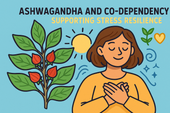
Ashwagandha and Co-Dependency: Supporting Stress Resilience
Stress is more than a feeling—it’s a full-body signal that your system is overwhelmed. When the mind races and the body tenses, your hormones, breathing, and focus all shift into survival mode. Chronic stress doesn’t just affect emotions—it reshapes your nervous system, drains your energy, and clouds your clarity. Learning to understand and manage stress gently is the first step toward peace, balance, and true recovery. 🌿💫
-

Why Co-Dependency Feels Draining: Adrenal Fatigue and Supplements That Help
The adrenal glands are small but powerful organs that sit above your kidneys, acting as your body’s built-in stress managers. They produce hormones like cortisol and adrenaline that help regulate energy, mood, and resilience. When they’re overworked from chronic stress or emotional exhaustion, fatigue and imbalance follow. Supporting adrenal health naturally can help restore calm, energy, and hormonal balance. 🌿⚡
-

The Link Between Anxiety, Co-Dependency, and Natural Support
Anxiety feels like living in constant alert mode—your heart races, your thoughts loop, and your body can’t find peace. It’s the nervous system’s way of preparing for danger, even when none exists. Understanding what’s happening in your mind and body is the first step toward calming the storm and restoring balance. 🌿💫
-

Supplements That Support Dopamine and Serotonin in Co-Dependent Patterns
Serotonin is the neurotransmitter of calm, confidence, and contentment. When it’s balanced, you feel peaceful and emotionally grounded. When it’s low, anxiety, mood swings, and emotional dependence take over. By understanding serotonin’s role in emotional health—and how to support it naturally—you can rebuild inner stability, improve relationships, and cultivate lasting happiness from within. 🌞💫
-

How Emotional Exhaustion in Codependency Impacts the Nervous System
The nervous system is the body’s communication network, connecting the brain to every organ and muscle. It regulates stress, mood, and emotion through a delicate balance of electrical and chemical signals. When overwhelmed, it can become dysregulated—leading to fatigue, anxiety, and emotional imbalance. Understanding how to calm and strengthen the nervous system is key to healing from chronic stress and emotional burnout. ⚡🌿
-

What Is Co-Dependency? The Role of Brain Chemistry and Stress
Stress is more than a feeling—it’s a full-body experience that begins in the brain and ripples through every cell. When cortisol surges and the nervous system stays on alert, your body can’t rest or recover. Over time, this constant tension affects energy, focus, mood, and even immune health. Understanding stress chemistry is the first step toward breaking free from burnout and finding calm again. 🌿
-

Creating a Supplement Stack for Motivation, Energy, and Anti-Procrastination
Motivation is the fuel behind every meaningful achievement—but it’s not just about willpower. It’s a mix of mindset, brain chemistry, and momentum. When energy, focus, and purpose align, action feels natural instead of forced. Learn how to harness motivation as a daily state, not a fleeting feeling.
-

Supplements for Building Consistency and Reducing Chronic Procrastination
Biochemistry is the bridge between biology and chemistry—the science of life at the molecular level. It explains how nutrients, hormones, and neurotransmitters interact to create energy, thought, and emotion. From brain function to muscle movement, biochemistry reveals the invisible processes that sustain health, balance, and vitality.
-

GABA and Procrastination: Supporting Calm Focus for Productivity
GABA is the brain’s natural calming messenger—a neurotransmitter that helps slow mental overactivity and ease stress. When GABA levels drop, focus fades, anxiety rises, and procrastination becomes more likely. By supporting GABA through nutrition, lifestyle, and supplements, you can restore calm clarity, improve focus, and take action with steady, balanced energy.
-

Ashwagandha and Procrastination: Lowering Stress to Improve Action
Science is the language of curiosity and discovery. It helps us understand the hidden patterns behind life, energy, and the universe. Through experimentation and critical thinking, science connects imagination to evidence—turning questions into knowledge. Whether through microscopes, molecules, or minds at work, science represents our endless pursuit of truth and innovation.
-

Neurotransmitters and Motivation: Supplements That Support Drive and Focus
Supplements can do more than boost physical health—they can also enhance mental clarity, focus, and motivation. Nutrients like omega-3s, magnesium, B vitamins, and adaptogens help balance neurotransmitters, stabilize mood, and support brain energy. When combined with good sleep, nutrition, and mindful habits, they can transform how your brain performs under stress.
-

How Stress Hormones Like Cortisol Fuel Procrastination (and What Helps)
Blood sugar isn’t just about physical health—it directly impacts focus, mood, and motivation. When glucose levels spike and crash, energy and attention do the same, fueling procrastination and brain fog. Learning how to stabilize blood sugar through balanced meals, mindful habits, and key nutrients helps keep your mind steady, focused, and ready to act.
-

Brain Fog and Procrastination: Supplements for Mental Clarity
Brain fog can turn even simple tasks into mental hurdles. When your thoughts feel slow and unclear, procrastination often follows—making focus and productivity seem impossible. This article explores the biochemical and lifestyle causes of brain fog and reveals the most effective supplements for restoring mental clarity, focus, and sustained energy.
-

The Link Between Low Energy and Procrastination: Can Supplements Help?
Neurochemistry shapes how we think, feel, and act. When neurotransmitters like dopamine, serotonin, and GABA fall out of balance, it can lead to fatigue, anxiety, or lack of motivation—fueling procrastination and low mood. Understanding the brain’s chemical communication system helps us find ways to restore focus, calm, and emotional stability through nutrition, mindfulness, and targeted supplements.
-

Why Do We Procrastinate? The Role of Dopamine and Supplements That Support It
Dopamine is the brain’s motivation messenger—the chemical that fuels focus, reward, and drive. When dopamine levels drop, even simple tasks can feel impossible to start. This article explores how dopamine shapes procrastination, motivation, and mental energy, along with natural supplements and daily habits that help restore balance and get things done.
-

Phosphatidylserine and Stress Reduction for People with BDD
Stress is more than a mental state—it’s a full-body experience that affects hormones, brain chemistry, and emotional balance. For people with Body Dysmorphic Disorder (BDD), constant tension and worry about appearance can overload the nervous system. Learning how stress works and finding ways to calm it is key to breaking the cycle of anxiety and self-criticism.
-

How Antioxidants Like Vitamin C & E Support Mental Health in BDD
Antioxidants are the body’s natural defense against stress and inflammation. For people with Body Dysmorphic Disorder (BDD), oxidative stress can worsen fatigue, anxiety, and emotional imbalance. Nutrients like Vitamin C and E help protect brain cells, boost neurotransmitter function, and support a calmer, clearer mindset—building a stronger foundation for recovery.
-

Ginkgo Biloba and Memory Support for BDD Recovery
Emotional regulation is the foundation of healing from Body Dysmorphic Disorder (BDD). When the nervous system stays in constant overdrive, even small stressors can trigger self-critical spirals. Learning to calm emotional reactivity helps restore clarity, confidence, and a sense of inner balance. By blending mindfulness, nervous system support, and self-compassion, you can retrain your brain to respond—not react—to emotion.
-

Alpha GPC and Cognitive Function in Body Dysmorphic Disorder
Mental fatigue can feel like your brain has hit a wall—thoughts slow down, focus fades, and motivation disappears. For people with Body Dysmorphic Disorder (BDD), chronic overthinking, emotional stress, and constant self-evaluation can deplete mental energy even further. Understanding what causes this cognitive exhaustion is the first step toward recovery—through rest, balanced nutrition, and targeted brain-supporting supplements.
-

N-Acetyl L-Tyrosine and BDD: Supporting Mental Clarity
Chronic stress doesn’t just affect your mood—it reshapes your brain chemistry, weakens focus, and fuels the obsessive thought loops common in Body Dysmorphic Disorder (BDD). Over time, constant cortisol elevation drains mental energy and emotional balance. Learning to recognize and manage chronic stress is essential to restoring mental clarity, self-compassion, and resilience.
-

Chamomile and Lavender for Calming Obsessive Body Image Thoughts
The nervous system is the command center of our emotional and physical world—and in Body Dysmorphic Disorder (BDD), it often operates in overdrive. Understanding how the brain and body communicate under stress reveals why intrusive thoughts feel uncontrollable. Learning to regulate the nervous system through calm practices, nutrition, and supplements helps restore inner balance and emotional safety.
-

Adaptogens for Body Dysmorphic Disorder: Rhodiola, Ginseng, and More
Rhodiola rosea, often called the “golden root,” is an adaptogenic herb renowned for boosting stress resilience and mental endurance. For individuals with Body Dysmorphic Disorder (BDD), Rhodiola may help reduce fatigue, regulate cortisol, and enhance emotional balance. By supporting both mind and body, this powerful plant promotes calm focus, improved mood, and renewed energy to face daily challenges.
-

B Vitamins for Stress Resilience in BDD: Rebuilding Calm from Within
Biochemistry is at the heart of every thought, emotion, and reaction we experience. In Body Dysmorphic Disorder (BDD), chemical imbalances in neurotransmitters like serotonin, dopamine, and GABA can amplify stress and distort self-perception. Understanding the biochemistry behind mood and stress regulation offers a path toward healing—bridging the gap between emotional experience and the body’s molecular balance.
-

Melatonin and Body Dysmorphic Disorder: Restoring Healthy Sleep Patterns
Melatonin, the body’s natural sleep hormone, plays a vital role in helping people with Body Dysmorphic Disorder (BDD) restore healthy sleep cycles. When anxiety and obsessive thinking interfere with rest, melatonin levels often drop, leading to more emotional reactivity and distorted self-perception. This article explores how melatonin works, why BDD disrupts it, and how natural supplementation—combined with mindful routines—can help the brain and body finally find calm at night.
-

Sleep Struggles with BDD: Supplements for Rest and Recovery
When you’re living with Body Dysmorphic Disorder (BDD), restful sleep can feel impossible—but the right supplements can help reset your body’s natural rhythm. From magnesium and L-theanine to 5-HTP and ashwagandha, these nutrients support relaxation, lower cortisol, and enhance melatonin production. This article explores how supplements can calm the mind, ease nighttime anxiety, and promote true restorative sleep for emotional and physical recovery.
-

5-HTP and Serotonin Balance: Could It Help with Body Dysmorphic Disorder?
Anxiety can feel like a storm inside the mind—restless, overwhelming, and hard to control. In people with Body Dysmorphic Disorder (BDD), anxiety often fuels obsessive thoughts and self-criticism, creating a painful cycle of worry and self-doubt. This article explores the biological roots of anxiety, the role of neurotransmitters like serotonin and GABA, and how natural strategies such as mindfulness, supplements, and nervous system regulation can restore calm and mental clarity.
-

L-Theanine for BDD: Finding Calm in the Mind
Neurochemistry plays a central role in how we think, feel, and see ourselves. For those living with Body Dysmorphic Disorder (BDD), imbalances in neurotransmitters like serotonin, dopamine, and GABA can intensify anxiety, obsessive thoughts, and emotional distress. This article explores how regulating brain chemistry through supplements, mindfulness, and lifestyle changes can bring the nervous system back into harmony and restore inner calm.
-

Omega-3 Fatty Acids and Body Image Disorders: Supporting Emotional Health
Omega-3 fatty acids do far more than support heart health—they nourish the brain, stabilize mood, and may ease the emotional turbulence tied to body image disorders like BDD. This in-depth article explores how omega-3s regulate serotonin, dopamine, and inflammation, helping individuals reduce obsessive thoughts and rebuild self-acceptance. It also connects nutrition to therapy, mindfulness, and nervous system balance for holistic emotional healing.
-

Magnesium and BDD: Calming an Overactive Nervous System
Magnesium plays a crucial role in calming an overactive nervous system—something people with Body Dysmorphic Disorder (BDD) struggle with daily. This article explores how magnesium supports relaxation, emotional regulation, and stress reduction while diving into the science behind its connection to brain chemistry. It also examines how combining magnesium supplementation with therapy and breathwork can help rebalance the body’s stress response, reduce obsessive thought patterns, and promote lasting nervous system calm.
-

The Gut-Brain Axis and BDD: Why Probiotics Might Matter
The gut and brain are constantly in conversation — and that dialogue may shape how you experience Body Dysmorphic Disorder. By nurturing your microbiome with probiotics, prebiotics, and gut-healing nutrients, you can help rebalance serotonin, calm anxiety, and restore emotional stability from within 🧠🦠.
-
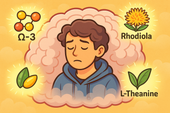
Brain Fog and Body Dysmorphic Disorder: Can Nootropic Supplements Help?
Brain fog often accompanies Body Dysmorphic Disorder, clouding focus and deepening emotional fatigue. Nootropic supplements like L-theanine, Rhodiola, and CoQ10 can help restore mental clarity, balance neurotransmitters, and bring calm energy back to the mind 🌿🧠.
-

How Stress Hormones Like Cortisol May Worsen Body Dysmorphic Disorder
Chronic stress floods the brain with cortisol — the hormone that keeps you on high alert. In Body Dysmorphic Disorder, this chemical overdrive fuels anxiety, distorts self-image, and traps the body in survival mode. Calming cortisol helps restore both peace and perspective 🌿🧠.
-

The Role of Neurotransmitters in BDD—and How Supplements May Help
Neurotransmitters like serotonin, dopamine, glutamate, and GABA shape how people with Body Dysmorphic Disorder perceive themselves. When these brain messengers fall out of balance, perception distorts — but targeted supplements can help restore calm, focus, and emotional regulation 🧠🌿.
-

What Is Body Dysmorphic Disorder? A Deeper Look at the Mind-Body Connection
Body Dysmorphic Disorder (BDD) isn’t just about appearance — it’s about perception. When brain chemistry, trauma, and stress distort self-image, the mind begins to see flaws that aren’t truly there. Healing starts by calming the nervous system and reconnecting mind and body 🪞🧠.
-
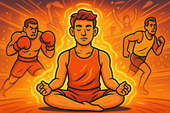
Keeping Calm in Competitive Sports: How to Train Your Mind, Body, and Chemistry for Peak Performance
Competitive pressure can overwhelm even the strongest athletes — but calm is trainable. By combining supplements like magnesium, L-theanine, and adaptogens with breathwork and mindset training, you can stay focused, balanced, and in control under any level of stress 🧠🏅.
-
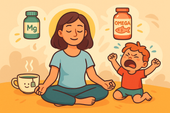
Supplements for Parents Facing Toddler Tantrums: Staying Calm When Little Emotions Run Wild
Toddler tantrums can drain even the most loving parent — but your calm is powerful. With the right supplements like magnesium, L-theanine, and ashwagandha supporting your nervous system, you can stay patient, grounded, and kind, even when emotions run high 🧸🌿.
-

Workplace Stress and Anger Management Support
Workplace stress can quickly turn into frustration — but calm is a skill you can train. By combining supplements like magnesium, L-theanine, and adaptogens with breathwork and mindset tools, you can stay focused, patient, and emotionally grounded no matter how intense the office gets 💼🌿.
-

How to Stay Patient With Family During Stressful Holidays
Holiday gatherings can stir up old stress and test your patience — but calm is possible. With nervous system support from magnesium, L-theanine, and adaptogens, plus mindful breathing and clear boundaries, you can stay centered, kind, and grounded even when family chaos unfolds 🎄💞.
-

Supplements to Keep Calm During Traffic Jams
Getting stuck in traffic doesn’t have to ruin your mood. With calming supplements like magnesium, L-theanine, and ashwagandha, you can train your body to stay relaxed and focused behind the wheel — turning gridlock into a moment of grounded patience 🚗🌿.
-
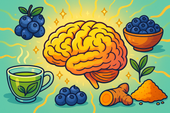
The Role of Antioxidants in Healing Brain Stress from Dissociation
Antioxidants protect the brain from the oxidative stress caused by trauma and dissociation. By neutralizing free radicals and supporting mitochondrial recovery, they help restore clarity, focus, and emotional balance — allowing the mind to heal at the cellular level 🌿🧠.
-
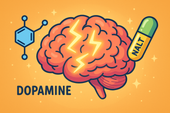
N-Acetyl L-Tyrosine (NALT) for Supporting Mental Clarity
N-Acetyl L-Tyrosine (NALT) fuels dopamine production — the neurotransmitter of focus and motivation. By supporting brain chemistry during stress, NALT helps restore mental clarity, energy, and alertness, making it easier to think clearly and feel present again ⚡🧠.
-

How Ginseng May Improve Focus and Energy in Dissociation
Ginseng helps combat the mental fatigue and fog that often come with dissociation. By supporting mitochondrial energy, balancing neurotransmitters, and regulating cortisol, it gently restores focus, motivation, and emotional presence — helping the mind reconnect with clarity and strength 🌿⚡.
-
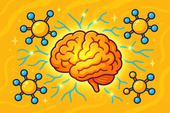
Phosphatidylserine and Dissociation: Supporting Cognitive Function
Phosphatidylserine helps calm the stress response by balancing cortisol, the body’s primary stress hormone. By lowering cortisol spikes, it protects memory, focus, and emotional stability — restoring clarity and mental presence for those struggling with dissociation 🧠🌿.
-
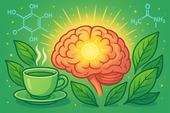
Can Green Tea Extract Help with Dissociative Brain Fog?
Green tea extract may help lift dissociative brain fog by supporting neurotransmitter balance, reducing inflammation, and enhancing energy at the cellular level. With its key compounds EGCG and L-theanine, it promotes calm focus, clarity, and emotional presence — helping you feel more alert and grounded 🍵🧠.
-
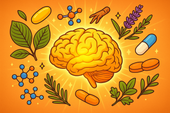
Building a Natural Supplement Stack for Dissociation Support
Building a supplement stack for dissociation means nourishing the brain and body back into communication. By supporting neurotransmitters, gut health, and energy balance through nutrients like magnesium, omega-3s, curcumin, and probiotics, you can help restore clarity, calm, and connection — one layer at a time 🌿🧠.
-

Chamomile and Lavender for Dissociative Anxiety Relief
Chamomile and lavender work together to calm dissociative anxiety by soothing the nervous system and restoring emotional safety. Their natural compounds balance cortisol, enhance GABA activity, and activate the vagus nerve — helping you feel grounded, connected, and at peace again 🌿💜.
-
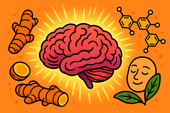
Curcumin for Inflammation and Mental Clarity in Dissociation
Curcumin, the golden compound in turmeric, does more than fight inflammation — it helps clear the mental fog often tied to dissociation. By calming neuroinflammation, balancing neurotransmitters, and supporting mitochondrial energy, curcumin can restore mental clarity, focus, and emotional presence 🌿🧠.
-
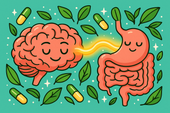
Probiotics and Dissociation: Exploring the Gut–Brain Axis
The gut–brain axis plays a vital role in emotional awareness and presence. When the microbiome is balanced, it supports serotonin production, vagus nerve activity, and calm focus. Probiotics help repair this connection — restoring safety, clarity, and the feeling of truly being in your body again 🌿🧠.
-
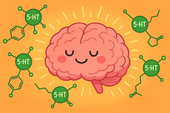
5-HTP for Dissociation: Supporting Serotonin and Emotional Stability
5-HTP helps bridge the gap between emotional numbness and stability by supporting serotonin production — the neurotransmitter that shapes mood, sleep, and sensory awareness. For people experiencing dissociation, 5-HTP may gently restore connection, presence, and emotional balance from the inside out 🌿🧠.

















































